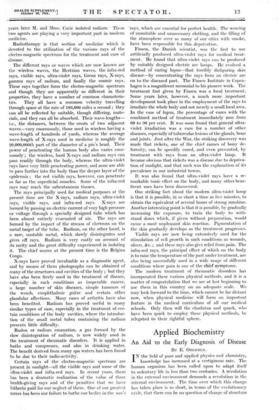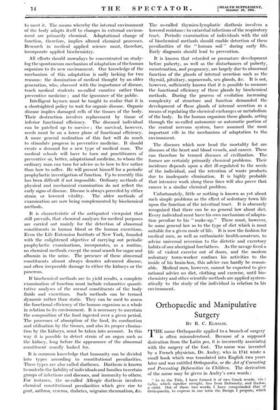Applied Biochemistry
An Aid to the Early Diagnosis of Disease BY E. OBER.MER.
IN the field of pure and applied physics and chemistry, knowledge has increased at a vertiginous rate. The human organism has been called upon to adapt itself to sedentary life in less than two centuries. A revolution in the external environment demands a revolution in the internal environment. The time over which this change has taken place is so short, in terms of the evolutionary cycle, that there can be no question of change of structure to meet it. The means whereby the internal environment of the body adapts itself to changes in external environ- ment are primarily chemical. Adaptational change of function, therefore, implies altered chemical processes. Research in medical applied science must, therefore, incorporate applied biochemistry.
All efforts should nowadays be concentrated on study- ing the spontaneous mechanism of adaptation of the human organism to its new environment. Our knowledge of the mechanism of this adaptation is sadly lacking for two reasons : the domination of medical thought by an older generation, who, obsessed with the importance of disease, teach medical students so-called curative rather than preventive medicine ; and the ignorance of the public.
Intelligent laymen must be taught to realize that it is a shortsighted policy to wait for organic disease. Organic disease implies damaged cells of the tissues of the body. Their destruction involves replacement by tissue of inferior functional efficiency. The diseased individual can be patched up to survive ; the survival, however, needs must be on a lower plane of functional efficiency. A more general realization of this fact will do much to stimulate progress in preventive medicine. It should create a demand for a new type of medical man. The medical schools will have to turn out practitioners of preventive or, better, adaptational medicine, to whom the ordinary man can turn for advice as to how to live rather than how to suffer. He will present himself for a periodic prophylactic investigation of function. Up to recently this has been difficult if not impossible. Ordinary methods of physical and mechanical examination do not reflect the early signs of disease. Disease is always preceded by either strain or lowered vitality. The older methods of examination are now being complemented by biochemical methods.
It is characteristic of the antiquated viewpoint that still prevails, that chemical analyses for medical purposes are carried out mainly for the detection of abnormal constituents in human blood or the human excretions. Even the Life Extension Institute of New York, founded with the enlightened objective of carrying out periodic prophylactic examinations, incorporates, as a routine, no chemical methods except the usual search for sugar and albumin in the urine. The presence of these abnormal constituents almost always denotes advanced disease, and often irreparable damage to either the kidneys or the pancreas.
If biochemical methods are to yield results, a complete examination of function must include exhaustive quanti- tative analyses of the normal constituents of the body fluids and excretions. Such methods can be termed dynamic rather than static. They can be used to assess the functional efficiency of the human organism as a whole in relation to its environment. It is necessary to ascertain the composition of the food ingested over a given period. The processes of absorption of the food, its combustion and utilisation by the tissues, and also its proper elimina- tion by the kidneys, must be taken into account. In this way it is possible to detect strain of an organ such as the kidney, long before the appearance of the abnormal constituent usually looked for.
It is common knowledge that humanity can be divided into types according to constitutional peculiarities. These types are also called diatheses. Diathesis is known to underlie the liability of individuals and families to certain groups of infections and diseases, and immunity to others. For instance, the so-called Allergic diathesis involves chemical constitutional peculiarities which give rise to gout, asthma, eczema, diabetes, migraine rheumatism, &c. The so-called thymico-lymphatic diathesis involves a lowered resistaner to catarrhal infections of the respiratory tract. Periodic examination of individuals with the aid of biochemical methods should enable detection of these peculiarities of the " human soil " during early life. Early diagnosis should lead to prevention.
It is known that retarded or premature development before puberty, as well as the disturbances of puberty, menstruation, and pregnancy, are largely due to abnormal function of the glands of internal secretion such as the thyroid, pituitary, suprarenals, sex glands, &c. It is not, however, sufficiently known that it is possible to measure the functional efficiency of these glands by biochemical methods. During the process of evolution increasing complexity of structure and function demanded the development of these glands of internal secretion as a means of regulating the chemical exchanges or metabolism of the body. In the human organism these glands, acting through the so-called autonomic or automatic portion of the central nervous system, have assumed the most important role in the mechanism of adaptation to the environment.
The diseases which now head the mortality list are diseases of the heart and blood vessels, and cancer. These can therefore be termed diseases of civilization. The former are certainly primarily chemical problems. Their incidence depends upon a diet ill-regulated to the needs of the individual, and the retention of waste products due to inadequate elimination. It is highly probable that intensive work along these lines will also prove that cancer is a similar chemical problem.
Unfortunately, little or nothing is known as yet about such simple problems as the effect of sedentary town life upon the function of the intestinal tract. It is obscurely recognized that there can be no general law about diet. Every individual must have his own mechanism of adapta- tion peculiar to his " make-up." There must, however, be some general law as to the type of diet which is most suitable for a given mode of life. It is now the fashion for medical men, as well as enthusiastic health-amateurs, to advise universal reversion to the dietetic and excretory habits of our aboriginal forefathers. As the savage lived a life of violent exercise out of doors, and the modern sedentary town-worker confines his activities to the inside of his brain-box, this advice can hardly be reason- able. Medical men, however, cannot be expected to give rational advice on diet, clothing and exercise, until bio- chemistry and other scientific methods are applied system- atically to the study of the individual in relation to his environment.



















































 Previous page
Previous page